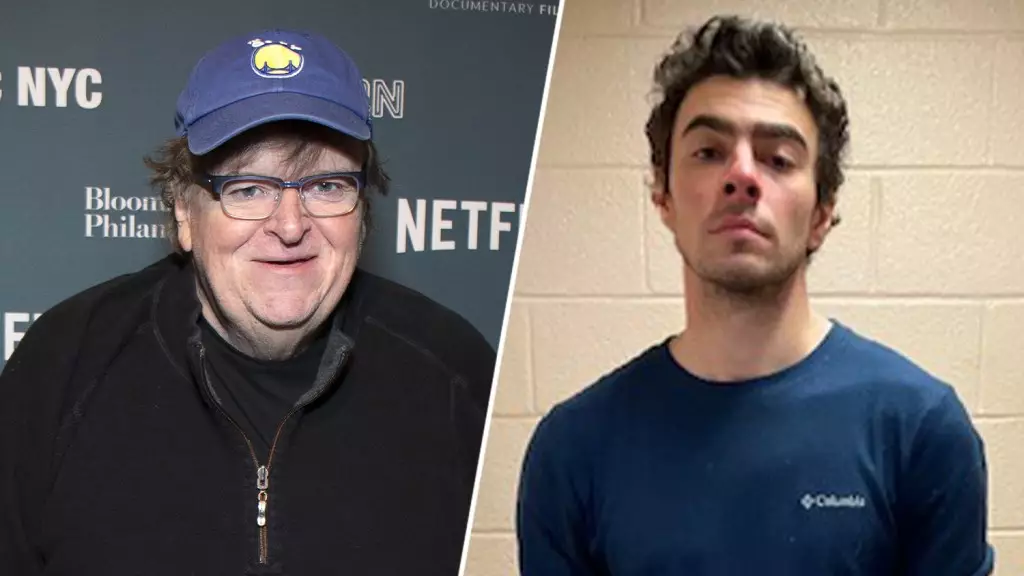The recent arrest of Luigi Mangione, alleged murderer of UnitedHealthcare CEO Brian Thompson, has thrust the conversation around American healthcare into the national spotlight. In the wake of this tragedy, documentary filmmaker Michael Moore has found himself inundated with media inquiries, demanding a response to Mangione’s manifesto, which points to the pervasive anger fueling these events. Moore’s reaction, articulated in an emphatic open letter, goes beyond mere condemnation of violence—it taps into a deep, simmering frustration regarding the American healthcare system. The killing of a CEO, while shocking, serves as a rallying point for the myriad grievances that countless Americans have harbored against healthcare profit-mongering.
Moore’s letter acknowledges that the anger towards a sector that profits from misery is justified. He argues that this sentiment is not emergent but rather the culmination of decades of suffering caused by a system designed to prioritize profits over patients. The immediate emotional response to Thompson’s death should not be viewed in isolation; it symbolizes the broader discontent with an industry that, according to Moore, “has levied against the American people” a grave injustice.
The media’s rapid pivot to reporting on Thompson’s assassination alongside Mangione’s background—that he hails from a wealthy family—illustrates a tendency to trivialize the larger systemic issues at play. Moore vehemently rejects the narrative that the anger should be tamped down or rationalized away. Instead, he believes it is critical for this rage to be amplified. He draws a pointed distinction between the motives of those expressing anger and the violent act itself. The emotional turbulence coursing through the nation likely does not stem from a desire to eradicate CEOs, a notion he dismisses as simplistic.
Moore accentuates that the deeper issues revolve around the profound experiences of pain and deprivation inflicted upon the populace by the healthcare industry. Families crushed under the burden of medical debt, individuals denied necessary treatments, and the relentless cycle of financial devastation are not isolated incidents but rather symptomatic of a systemic malaise. This anger, argues Moore, has been long in the making—boiling beneath the surface as millions grapple with healthcare inequities.
While acknowledging the injustice at hand, Moore carefully delineates his position on Mangione’s actions. He does not condone the murder of Thompson, labeling it as a “RICH ON RICH crime.” This term invites scrutiny as it introduces class dynamics into the narrative, emphasizing that the catastrophic consequences of the healthcare crisis have largely fallen on the economically disadvantaged, not the affluent. Moore’s perspective underscores a profound contradiction: violent actions do little to address systemic issues; instead, they risk overshadowing the critical message of reform and accountability that needs to be broadcast against the backdrop of healthcare profiteering.
Yet, Moore’s urgent call for reform is grounded in empathy; he argues that under no circumstances should anyone lose their life due to a lack of accessible healthcare. This principle resonates deeply in an era marked by growing inequality and disenfranchisement. Refusing to allow fear and anger to spiral into violence is essential to fostering a movement aimed at structural reform rather than retaliatory bloodshed. Moore hearkens back to the notion that no one should die because of the failure of a system that fails to prioritize public health over profitability.
A Call for Awareness and Action
In closing his letter, Moore offers a reminder of the underlying issues at stake by including a free link to his documentary, “Sicko”—a film that explores the multifaceted healthcare crisis in America. The documentary serves as both a historical account and a call to action, urging individuals to examine the entrenched realities of suffering that plague the American healthcare system. Moore’s compelling words challenge the public to view this tragedy not merely as an isolated incident but as an impetus for dialogue, advocacy, and change.
As the country grapples with the implications of Thompson’s death and the arrest of Mangione, it is essential to steer conversations toward a constructive exploration of systemic reform rather than dwell in the realm of violence. Moore’s advocacy may serve as a potential catalyst for igniting a movement that addresses the healthcare injustices long overdue for acknowledgment in the sinews of national policy.


Leave a Reply